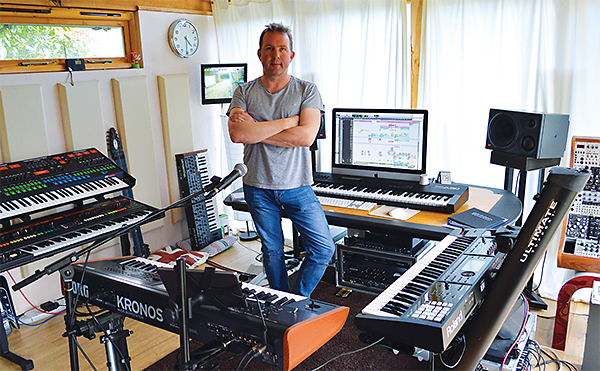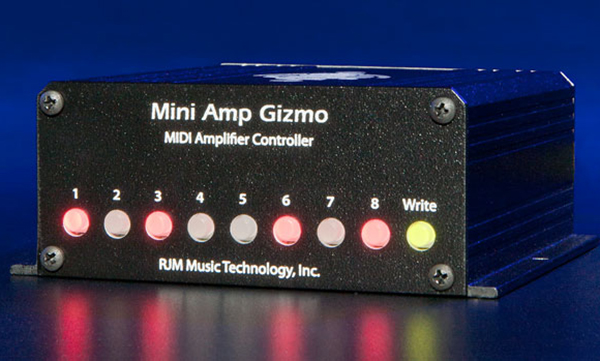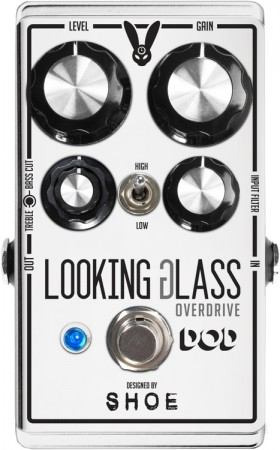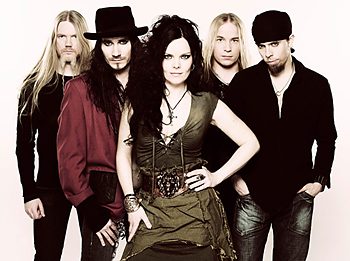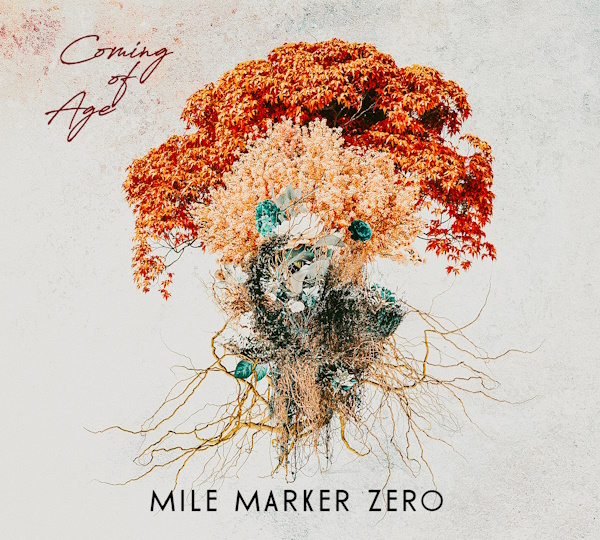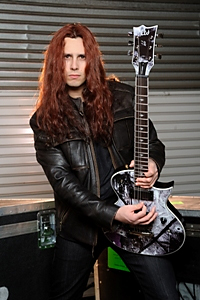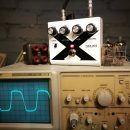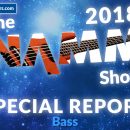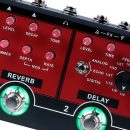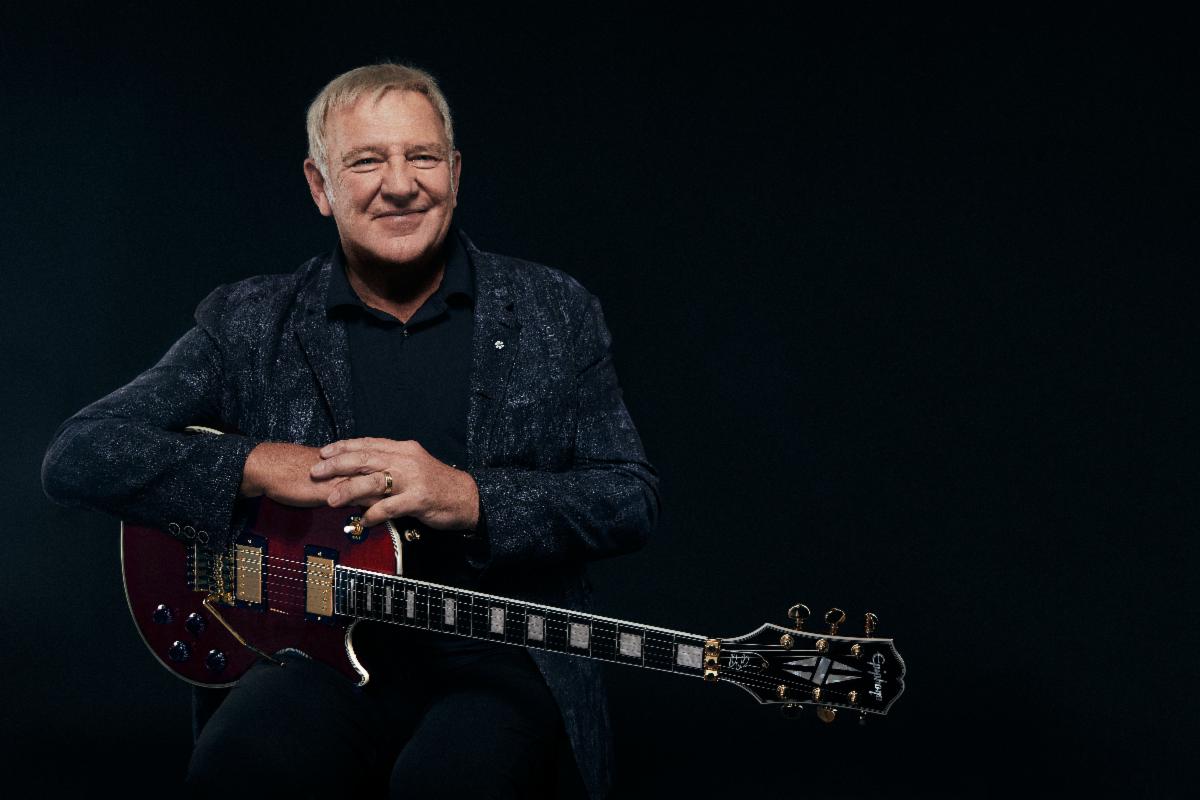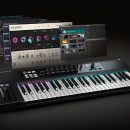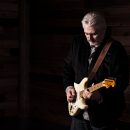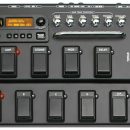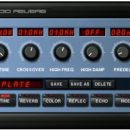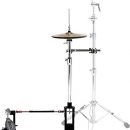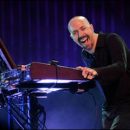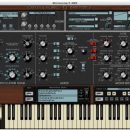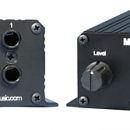For some strange reason, he went, ‘Oh, you should give Jem Godfrey a call.’
The UK progressive rock band, Frost*, is the brainchild of keyboard player and music producer, Jem Godfrey. Outside of his songwriting and production work in the pop space with notable bands such as Atomic Kitten and Morcheeba, Godfrey has played keyboards for Joe Satriani and Steve Vai, earning praise along the way in all of his musical endeavors. But none of his projects are quite as consuming as the compositions he creates in the progressive rock band, Frost* (the asterisk is part of the band name, so no need to hunt for any footnotes).
Unlike so many prog bands with a sound rooted in classic ‘70s prog (think Mellotron, Hammond, Minimoog, etc.), or prog metal bands with shred guitar and high-pitched vocals, Frost* delivers fantastic modern prog, and this means the music has modern synth sounds, modern production values, and a pop sensibility to balance out the awesome, proggy instrumental work. This isn’t “prog light,” nor “neo prog” as genre fanatics might be quick to proclaim. The three Frost* records are full of incredible musicianship, with odd time signatures, extended instrumental sections, and vintage vocal work. The songs are melodic, and they rock. It’s prog rock for young modern rock fans, musicians, and old timers willing to give up the Mellotron.
Godfrey’s primary musical collaborator is guitarist John Mitchell, and the band has included members of other well-known prog and pop groups including Arena, IQ, and Level 42. With a sound that is best compared to groups like… Frost*, you’ll just have to begin listening to them to realize that they have a modern rock sound that is uniquely their own, save for some similarities shared with Mitchell’s own solo outing, Lonely Robot, which we also encourage you to explore.

Talking with Godfrey about his band’s latest (and third) studio release, Falling Satellites, we’re excited to introduce you to another incredible player who deserves to be on your required listening list.
"Numbers," from Falling Satellites
MPc: How did a pop music songwriter and producer from the U.K. shift his attention to progressive rock music, and how did a stint playing keyboards for Joe Satriani and Steve Vai on a G3 tour come into the mix?
JG: Well, I’ve always enjoyed lots of different types of music. I’m not someone that just says, right, this is the thing I like and that’s it. I like so many different types of music, you know. It’s kind of—I got into the pop thing quite by accident, really, it was just a set of very random circumstances. Which actually, ironically, is exactly how I ended up on the G3 tour. But I seem to attract random sets of circumstances. [laughs]
And, yeah, I just ended up doing pop. It was a fantastic education to think concisely and not do anything extraneous, and lessons in simplicity. And that’s great. It’s very, very good to do that. But after five years of that, I was starting to get a bit mad because I did want to play more interesting types of music than the pop stuff was letting me do.
So I kind of… one afternoon I got home from doing a particularly bland pop song and I just sat down at the piano and thought—I’m going to do the opposite. I’m going to have a bit of shred and just to play around and see what happens. And I basically wrote the track, “Hyperventilate,” at the piano over the course of a day or two.
And I felt very good about it. I didn’t really think anything else of it. So I kind of—you know, I went to the studio one other day and I kind of put the piano bit down and then I did a little bit of cymbals and kind of the intro bit, before the drums come in, that’s as far as I got. I didn’t touch it for about six months because I just thought, ah, one day I’ll finish that.
And then I think I had a week off or some time off and I just came to the studio and I just put it all down. It was really, really quick to do because I wasn’t really thinking about it being a release. I wasn’t thinking about it having a life outside of my studio. So I just basically played a little drums, played the keyboards, played the bass on the keyboards. And just sort of—and then thought, well, that was, I enjoyed that, great.
And then I thought, maybe someone—maybe there’s a prog audience out there that might want to hear it. So I think I played it for a couple of people and they said, “Oh, my god.” So, I thought that was quite nice.
So then I started to write more and more and more and before I knew it, I had an album. It was one of those weird, sort of—you don’t quite know you’re doing it while you’re doing it moments, until it’s all finished. And so that’s how the band was born. And I got John Mitchell to play guitar on some bits. I already had another guitar, an old friend of mine, named John Boyes, who did lots of the rhythm guitar. Actually, quite a lot of the lead on that, it’s actually a [Roland] V-Synth. People sort of—they assume it’s guitar, there’s quite a lot of lead synthesizer on that album.
MPc: I suspected as much, because I’ve actually got a V-Synth XT in my keyboard rig.
JG: You know the sound, then. [laughs] Yeah, I didn’t do much to disguise it because, again, I wasn’t really thinking about it as a release. So it was like, what’s it called? I forgot what it’s called. It’s a particularly brilliant sound which kind of has this marvelous wah on it and stuff. It was just a really expressive synth sound I really enjoyed. And also the V-Synth was very new at that point, so that sound wasn’t doing the rounds so much.
It sort of snowballed after that and I ending up playing for Joe and Steve, which was, again, another really random situation. I was asked to play a guest solo—again, actually, on a V-Synth—for a band called Big Big Train, on a song called “The Unferfall Train.” And I did a solo, had a really good time playing it. They just said, “Do that thing, have a play.” So I had a really good time. Sent it off and they said, “That’s great.” So I didn’t think about it again. I just got on with my life. And then I got an email, from Mike Keneally. Your readership will know who he is. He had been playing keyboards for Joe Satriani for the U.S. and U.K. leg of his Black Swans and Wormhole Wizards tour.
And, basically, he had to go and play Vai Fest, play that piano for Steve Vai, in New York I think it was, and there was a clash of dates. So basically, he’d spoken to Dave Gregory, of XTC, who was in Big Big Train. He said… I don’t know quite know why… he said, “You don’t know any keyboard players in the U.K. that can hack this set, do you?” For some strange reason—I’ve never met Dave Gregory, even to this day—he went, “Oh, you should give Jem Godfrey a call.”
So it was this really weird situation where suddenly this email just plopped into my box going, “Hi, you don’t know me, but…” I was, like, Oh, I totally know who you are, yeah, yeah, yeah. He just said, “Do you want to play a couple of sets with Joe Satriani?” So I went, let me think about it. Yeah, that’d be fine, yeah, great, okay. [laughs]
And it was sort of really mad. I got (sort of) parachuted in. I spent five days with the guys, learning how to do everything and play the set. I spent about a month beforehand going through all the songs and learning them all. And then I locked up with—locked up on tour with the band and Mike just had like a cool, I think it was and a Fender Rhodes, and that was it. And he was doing things—because he’s Mike, because he’s a genius. He was just basically—he was pitch transposing things and doing effects on the fly and everything. I programmed it all in my [Roland] Phantom and I was thinking, yeah, I’ve got this under control. And then I realized I wasn’t going to have my keyboard so I had to totally improvise using his rig. It was quite intense. But we got through it.
And then time went by again. We had a really good time, and then I think it was about a year or two later Joe’s manager rang up and said, “Oh, Mike can’t do the European leg of the G3 tour, would you mind doing it?” Which I was, like, Yeah, fantastic, that’d be great, be nice to see you again. And then there was a sort of, dot-dot-dot… “and Steve.” [laughs] Oh, right, okay. Yeah, that’d be great.
So, it was just the most incredible learning experience playing with these maestros. They are the most… all the bands on that tour were just amazing. It was just brilliant education and they were very, very gracious and very patient and very good-humored. I mean, I had a brilliant time.
I sat down every day for about eight hours and I just played this video again and again and again… And I just basically tried to teach myself how to play. By the end of the summer, I could play it.
MPc: You mentioned “Hyperventilate,” which is the beginning of Milliontown. And I couldn’t help but notice and I went back and forth today, but the “Hypoventilate” track on Falling Satellites, is that a continuation of the theme?
JG: [laughs] Is it? Oh, that’s—yes, I intended to do that, obviously. [laughs] No, there is a link, obviously. “Hypoventilate” has a lyrical, the title of it has to do with the lyrical concept of that particular suite of songs it’s attached to. Whereas in “Hyperventilate” it’s about breathing too much, too much oxygen, too much inhaling. “Hypoventilate” is obviously no oxygen and it’s, in the concept of the album, it’s the point of the protagonist’s death. So basically he’s having a very trippy moment because he’s being oxygen-starved. So it was kind of…
What that actually is, what that whole two-minute bit is is it’s the opening—I’ve told you what it is—it’s the song that starts that suite called “Heart Strings.” Has a riff that goes da-da-da-dee-dee-dee-dee-da-da-da, it’s got the [sings some chords]. What that “Hypoventilate” is, is it’s eight bars of “Heart Strings” put through a plug-in called PaulStretch. Which basically is a massive time stretcher. They used it on the [2012] Judge Dredd film. There was a drug that the characters in the film were taking. What they did was brilliant, which I loved about it, they, for the film, they used a Justin Bieber track which they stuck through PaulStretch. So it becomes this really kind of gothic kind of choral piece of music and this extraordinary stretched-out thing. And it’s basically a Justin Bieber track.
So I thought, I’m having a bit, I’m going to do that. So I took a little bit of one of my own songs, one of our songs and stretched eight bars into two minutes.
MPc: Across all three of the Frost* albums you’ve got a very consistent sound and vibe, which is somewhat surprising, given both the amount of time between releases as well as the constant rotation of personnel. So, what is it, besides your keyboards necessarily, that makes a Frost* record sound like a Frost* record?
JG: It’s probably a sort of chordal sense. I’ve got very—there’s this (sort of) sets of chords I really like. I’m a huge fan of John Barry, for a start, and I love all that sort of… the major-to-major chords. It’s C-major to E-major and all those sort of keyboard-y kinds of chords.
So I think there’s just a sort of—there’s a melodic sense and a chordal sense. Because I think of myself as a songwriter first and foremost. I tend to… I like the interplay between pedaling notes and different bass notes. Or, same bass notes, different chords. Whether that’s done with melody and chords vocally or with actual bass notes and chords and stuff, it’s a variety of things just playing, playing around with having one note maybe doing the same thing in some instrument or something and the other thing turning around. That’s a sort of musical motif I’ve never got tired of. I probably should. [laughs] I should probably try to find something else by now. I think I’m running out of ideas.
But, yeah, I think John and I have been in the band since day one, the guitarist. So there is a sort of sonic … there’s a sonic continuity that goes through all three albums, but I think basically what it is, it’s that kind of, Ennio Morricone slightly. There’s this sort of filmic—I like those great filmic composers and I like that sort of sense of atmosphere and I think I was just trying to get that through with synths and sounds.
MPc: John did the Lonely Robot album, right?
JG: Yes, he did, that’s right.
MPc: I remember the vibe was definitely in the same family.
JG: Yeah. Well, again, we like a lot of the same music and I think what we try and do is—in a very good, vented way, we sort of … you know, one of us will do an album and then release it and the other one goes, oh, okay, right. And then we get sort of competitive, in a friendly way, compositionally.
But we like a lot of the same things, we like a lot of the same bands and the same sort of modal stuff. I’m a—if I can get as much stuff in Mixolydian mode as possible, I’m a happy man. And John has started to do that, so we think along the same sort of lines. So it’s very complementary when we get together to write together or work together.
 Frost*
Frost*MPc: Who are some of the artists that inspired you as a keyboard player during the formative years, and what excites you today?
JG: Initially it would be Tony Banks. Well, actually to start with it would be Vince Clarke, actually. But it was my brother’s fault I got into prog, because he just basically played it non-stop for years until eventually, oh, I quite like it.
So, initially, I was a big fan of Depeche Mode and OMD and all those Brit synth pop bands in ’80, ’81. I was a huge fan. And I just always loved synthesizers. I always loved the sound of them and the slightly cold nature of them and the fact they’re not like guitars where you give them names and stuff. They’re just machines and I quite liked that.
So I think that was my initial influence. And then my brother sort of got me more into the prog rock side of things and then Tony Banks became—he was actually my piano teacher, and I didn’t realize it. Because what I did one summer is my brother had a video called Three Sides Live, which has a track from Genesis on it called “In The Cage.” Which has this very, quite fast sort of keyboard solo, so I thought that was quite interesting, dramatic. And I couldn’t play piano at the time, so what it is, we had a six-week summer vacation from school and what I did was, basically, the entire time I sat down every day for about eight hours and I just played this video again and again and again. And I just went da-da-da. Da-da-da-dah. And I just basically tried to teach myself how to play. By the end of the summer, I could play it.
So he was a very formative influence just because it was the music of Genesis. It was keyboard solos, basically, so it was good to learn how to play. Because every other song seemed to have a keyboard solo in it, so I thought, this is good, this is good value for the money.
I use the 61 keyboard just because it’s easier to get back the car. We’re not really playing stadiums yet.
And I think—Keith Emerson was another big influence. There was an album—Emerson Lake and Powell came out, they kind of got quite direct. And sort of AOR-y. But it was still with keyboards very much at the forefront, no lead guitar. So I remember just being bowled away by how much of a lead player Keith was and how unapologetic he was with the sounds he used. I loved that about him. He was, THIS IS ME! I’M PLAYING HERE NOW! AND YOU WILL LISTEN TO ME! It was kind of—I used to love that. And he used these great sounds, and he had a Kurzweil K250 and this was when the whole digital sampling synths were coming out and I was just really into all that. I used to buy Keyboard Magazine. And it was just this other world, I’d think, well, one day, one day.
And so I think they were the influences I really anchored onto when I was in my teenage years. As I got older, I got back to electronica again. I started to listen to a lot of—there was, a lot of dance music in the ‘90s that was very interesting—bands like Sneaker Pimps and Morcheeba and this slightly trip-hoppy kind of Bristol thing going on. And then some more New Age stuff. Deep Forest, I really liked, Michel Sanchez and the stuff that he did, a brilliant keyboard player. Windows was his solo album. He had this brilliant—he’s just playing amazingly and just getting back to synths, really.
And then latter years I’ve become a big fan of more electronic artists like John Hopkins, who’s a U.K.-based electronic musician who, again, uses fantastic chords and sounds and textures and Tim Exile, he does a lot of stuff with Native Instruments. He’s kind of a more—he’s a sort of a mad professor version.
And then people like Thomas Dolby. I have gotten back to my initial influence, which is more electronic music than prog music, I suppose.
MPc: In case you’re not aware, last year they reissued Genesis’ Three Sides Live on Blu-ray, fully restored and remastered.
JG: Oh, yeah?
MPc: I highly recommend it.
JG: Wow, okay, I’ll do that. That sounds brilliant!
MPc: My favorite part was the behind-the-scenes footage, seeing Tony Banks reaching into his Prophet 5, tuning it up with an oscilloscope before a show.
JG: See, that’s brilliant. [laughs] That’s, I think… at the time I had no idea what was going on. I was thinking, wow, there’s like a screen and stuff. I didn’t realize that was because those things were just completely unreliable. So now I see. Although now I see, I do have… I’ve been searching for about fifteen years, I finally bought this year an ARP Quadra. After a very, very long search. And it’s actually, as I speak to you, it’s right by my left hand. I gaze at it lovingly every day. When it works, which isn’t very often. [laughs]
MPc: Nice. [laughs] Thinking about your influences, I’m going to go back to Milliontown for a second. One of my favorite tracks on there, “The Other Me,” you were totally channeling Gary Numan’s “Are Friends Electric” there.
JG: Yes. Yeah, I can’t deny that. Again, it was kind of one of those things I’ll just put my influence on there because that makes me laugh. So it’s kind of—yeah, there’s a couple of, on the new album, there’s a couple of unashamed bits of “influence” in a few moments.
But I don’t think it’s a problem necessarily for musicians to acknowledge where they come from, musically. He’s influenced me. A lot of people won’t notice that and I think the people that do that kind of stuff, it’s kind of an in-joke, and for those in the know, it’s quite connecting, I think.
MPc: And when you mentioned the Emerson, Lake and Powell album, I was drawn into that, too. We were around the same age in the ‘80s. I discovered Genesis from Invisible Touch. The old, diehard prog heads were like, “Oh, that’s not real prog.” But it was that, and it was Yes’ 90125.
JG: Exactly. Good to mention that. We came in at that point where all the diehard prog guys were, “Oh, they’ve sold out, this is horrendous.” And I was thinking this is great!
MPc: I didn’t discover the prog “classics” until years later. So it was great hearing you talk about all that. Remember the video for “Touch & Go” from Emerson Lake and Powell?
JG: Yeah. It was, like, it was—I remember it was filmed with the camera with very, very poor focus because everything seemed to be blurred.
MPc: Yes, and you were trying to figure out what all those keyboards were. It was just amazing.
JG: I know, I know! You suddenly realized that there were people out there that do this for a living with that, doing that, so you think, oh, this is amazing. I could do that. I remember finally figuring out I wasn’t quite as alone as I thought I was previously.
MPc: Your music is extremely modern-sounding progressive rock. And I think I attribute a lot of that to your choice of keyboards and synthesizer sounds. So much of “classic” prog is fixated on Mellotron, organ and Minimoog.
JG: Yes.
MPc: But you’ve totally embraced, gone in the other direction—you’ve embraced modern synth sounds. Let’s talk about your keyboards that you’re using on Falling Satellites, and in general.
JG: It sort of varies. I’m a terrible buyer and seller of stuff. I always find it’s quite… there’s always that lovely moment when you get a new synthesizer and you play it for a bit and suddenly all these riffs come out and you think, Ah, this is brilliant, right on. And it’s that level of inspiration, it’s always quite nice if you get new instruments to play with. So I tend to troll eBay and buy things here and there, sort of play them and then either donate them to friends, there’s a lot of stuff stashed around the U.K. that I own but have gotten bored of. And a lot of it I’ll sell to buy other things.
So it tends to vary but the main keyboards for this album, the Quadra sort of arrived about six weeks before we finished, so we—the album, we did it sequentially, so as the album progresses more and more Quadra starts to appear. So the track at the end, “Nice Day for it…” is this sort of brassy sound, that’s what Quadra does, the lead sound. That was the crown jewel, saw-tooth lead thing that it does very well. And also there’s a brilliant arpeggiator, as well, so it’s kind of—it got a really, really good use towards the end.
And I think the rest of it, I’m not really particularly tied to any one synth, a lot of it will be soft synths or it’ll be, I had a Vintage Vibes ‘73 Rhodes, which was lovely, which I used to stick through Guitar Rig. And got a lot of interesting textures. I tend to use a lot of effects on synths, just to get them to sound a bit different from presets. Because it’s, again, it’s probably that Tony Banks [thing], you can get some brilliant overtones out of them and the Rhodes was brilliant for that because the bass end through Guitar Rig was as good as it gets. So, it’s different sorts of things.
I’ve got some medium-sized modulars—well, small modulars, I suppose, really, by some people’s standards. And, again, there were some little bits, that sort of connect songs, that were… there’s a little bit that comes out. There’s a track called “Signs,” goes into a song called “Lights Out.” And there’s a little kind of echo-y thing, stutter-y thing going on and that was the modular. Which basically I’ve got this world band radio and I just stuck it into the modular and patched it up and just let it go, basically. It’s very organic.
So I just let it run, recorded about twenty minutes of it and then took the bits that sounded really good, used those where it’s just creating ambient atmosphere. I was always a big fan of Jeff Lynn and ELO. And it would have these little, tiny connecting bits between some of these—like an orchestra run backwards. Like, that bit from a song you haven’t heard yet, played slowed down, I used to love all that kind of playing around with sound and making segues that way.
So it’s not a real… there’s no real main acts, really, it just tends to be wherever fitted.
I still use the Korg Wavestation plug-in a lot. That forms a great chunk of my lead sound, but again, I stick it through Guitar Rig, so it’s kind of more of a screaming element. And the particular sound I’ve got, the original patch had a sort of flattened fifth harmonic in it, which was a bit inharmonic, so I dialed that out, made it all fifths and nice and stuff.
I’m still looking for an [Wavestation] EX [physical keyboard], actually. I like the hardware. It just has that whole vector thing. And I have a Kronos 2, which is brilliant for live, it’s just the best keyboard I’ve ever used. It’s so powerful and flexible and sounds so great, all different engines in it and song playing. Live I use a lot of samples, so I use it as a great, big sampler in many ways. And just the key—now, I use the 61 keyboard just because it’s easier to get back the car. We’re not really playing stadiums yet.
It’s made such difference in putting things together, putting combos together. It’s a brilliant, brilliant keyboard. I don’t actually use it so much in the studio, to be honest. But live, it’s indispensable.
MPc: Tell me about the female voice on “Lights Out.” I love that.
JG: She’s a friend of mine, Tori Beaumont, and she’s a session singer. I do lot of work with her in other areas. Because the song is a, it’s a sort of lullaby between a mother and her unborn child. So it’s kind of—if I’d done it, it would sound a bit odd, to be honest. And she has lovely sort of vulnerable voice and she sounds—she just has a really, really wonderful, a lovely tone in her voice.
She did it remotely, she emailed it over. It was so lovely, and the thing about it is, there’s a lot, in the U.K., at least, there’s a lot of prog bands, you have a female vocalist or get female guests in in other prog bands. So everyone goes, Ahh, it’s such-and-such and such-and-such a band. Ahh, yes, it’s this person.
What I wanted to do is, and then, in your brain when you hear that you create a pre-form idea. You go, right, she’s in that band, therefore it’s this kind of song and you expect something. And what I wanted to do with Tori, because she’s totally notpart of this scene, it was just kind of—people just go, “Who’s that?” And it totally throws your sense of what’s going to happen next on that first listen. Her voice is so fantastic on it, it fulfilled both purposes.
MPc: Nice. And to an ear that knows the playing, it was obvious that Joe Satriani played guitar on “Closer to the Sun.”
JG: Everyone says that! I can’t… I clearly haven’t been listening to his albums enough. [laughs] But enough people have said, well, that’s… there he is. Which is quite funny. But yeah, he is an unmistakable sound.
MPc: Did you ship him files or did he actually come over to the U.K. to track that?
JG: Oh, no, I shipped him the files because—because, yeah, he was on tour, he was out again. Or maybe making the album following the one we did. But, yeah, we stayed in touch because he’s a lovely guy, he’s a proper gentleman and he’s got a brilliant sense of humor. He totally gets British humor which is really, really hard. So, he…
MPc: Come on, I grew up on The Benny Hill Show, okay?
JG: That’s fine, you’re okay, you’re all right, you’re a lad in the club, it’s fine. [laughs]
But what it was, he must get a thousand requests every week—you know, “Could you play on my record?” And initially I just thought, Oh, it’s so tacky of me to ask. But then the thing about it and the reason why I thought he might go for it, and why I wanted him to play on that particular bit, was because I think, if I’d sent him just some heavy rock track and said, “Can you give me thirty-two bars of do-do-do,” he probably would have gone, “No, no,” right? But because it was completely electronic and it was the juxtaposition of that really heavy Satch sound on something that’s entirely electronic, you know, electronic drums… that track is all me. So, yeah, the start of that track is all me playing. And then the rest of the band comes in as it gets heavier.
And I think at that initial point, I think he was quite attracted to the fact that it’s not something that you would normally hear. You’d expect it to be, like, keyboard sounds, and suddenly Satch says, “IT’S ME!” Dadadada, and he’s off! That appealed to him as much as it appealed to me. He worked really well. It’s an absolutely brilliant solo.
"Black Light Machine (in studio)," from The Rockfield Files DVD

